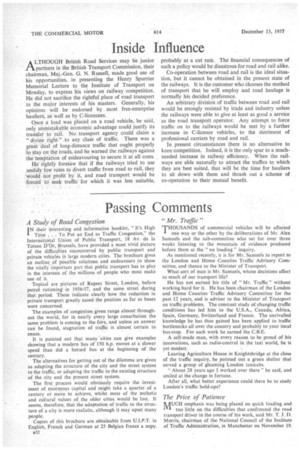Inside Influence
Page 42

If you've noticed an error in this article please click here to report it so we can fix it.
A LTHOUGH British Road Services may be junior PI partners in the British Transport Commission, their chairman, Maj.-Gen. G. N. Russell, made good use of his opportunities, in presenting the Henry Spurrier Memorial Lecture to the Institute of Transport on Monday, to express his views on railway competition. He did not sacrifice the rightful place of road transport to the major interests of his masters. Generally, his opinions will be endorsed by most free-enterprise hauliers, as well as by C-licencees.
Once a load was placed on a road vehicle, he said, only unmistakable economic advantage could justify its transfer to 'rail. No transport agency could claim a "divine right ". to any dais of traffic. There was a great deal of long-distance traffic that ought properly to stay on-the'roads,.and he warned the railways against the temptation of endeavouring to secure it at all costs.
He rightlY foreSaw that if the railways tried to use uindilly low rates to divert traffic from road to rail, they 'would not idfit• by. it, and road transport would be forced. to. Seek traffic• for which it was less suitable, probably at a cut rate. The financial consequences of such a policy would be disastrous for road and rail alike.
Co-operation between road and rail is the ideal situation, but it cannot be obtained in the present state of the railways. It is the customer who chooses the method of transport that he will employ and road haulage is normally his decided preference.
An arbitrary division of traffic between road and rail would be strongly resisted by trade and industry unless the railways were able to give at least as good a service as the road transport operator. Any attempt to force traffic on to the railways would be met by a further increase in C-licence vehicles, to the detriment of professional carriers by road and rail.
In present circumstances there is no alternative to keen competition. Indeed, it is the only spur to a muchneeded increase in railway efficiency. When the railways are able naturally to attract the traffics to which they are best suited, that will be the time for hauliers to sit down with them and thrash out a scheme of co-operation to their mutual benefit.




















































































































